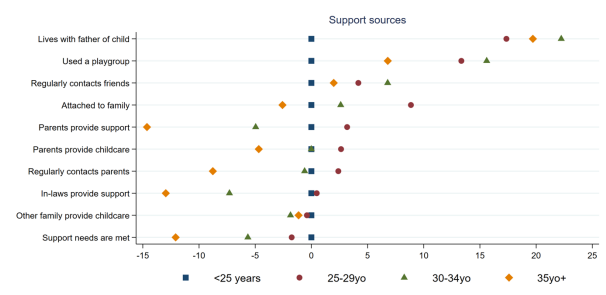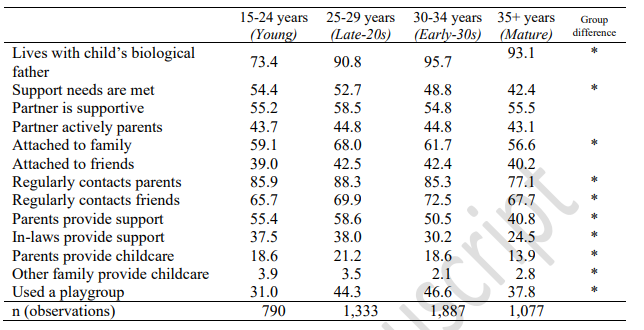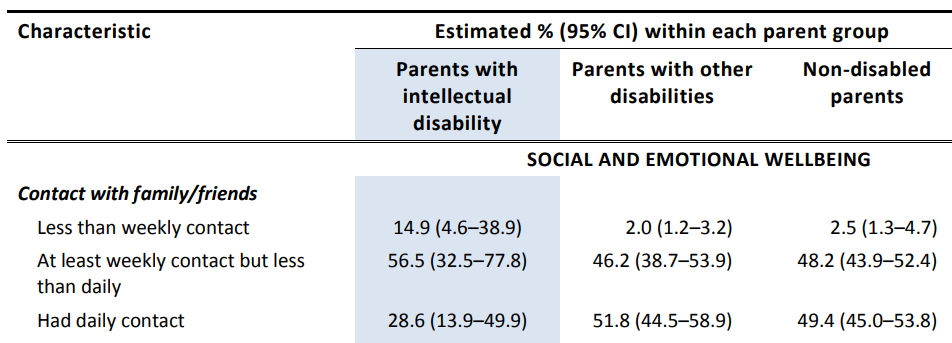link to page 1 link to page 1 link to page 2 link to page 2 link to page 2 link to page 3 link to page 5 link to page 6 link to page 7
 DOCUMENT 4
[Resea
DOCUMENT 4
[Resea
FOI
rch type]
24/25-0189
OFFICIAL
For Internal Use Only
Informal support for adolescent parents
The content of this document is OFFICIAL.
Please note:
The research and literature reviews collated by our TAB Research Team are not to be
shared external to the Branch. These are for internal TAB use only and are intended to
assist our advisors with their reasonable and necessary decision-making.
Delegates have access to a wide variety of comprehensive guidance material. If
Delegates require further information on access or planning matters they are to call the
TAPS line for advice.
The Research Team are unable to ensure that the information listed below provides an
accurate & up-to-date snapshot of these matters.
Research question: What are the average hours of informal support provided to parents aged
15-17 with and without a disability for the care for their children?
Date: 20/12/2021
Requestor: Sarah s47F - personal privacy
Endorsed by (EL1 or above): Jane s47F - personal privacy
Cleared by: Illya s47F - personal privacy
1.
Contents
Informal support for adolescent parents ..................................................................................... 1
1.
Contents ....................................................................................................................... 1
2.
Summary ...................................................................................................................... 2
3.
Limitations ..................................................................................................................... 2
4.
Adolescent parents ....................................................................................................... 2
4.1
Informal Support for adolescent parents .................................................................... 3
4.2
Adolescent parents with a disability ........................................................................... 5
5.
References ................................................................................................................... 6
6.
Version control .............................................................................................................. 7
V1.0 21-12-2021
Informal support for adolescent parents
Page 1 of 7
OFFICIAL
Page 1 of 7
link to page 3 link to page 5 link to page 2
 [Resea
[Resea
FOI
rch type]
24/25-0189
OFFICIAL
For Internal Use Only
2. Summary
I have not been able to find an answer to the stated research question.
There is mixed evidence regarding the amount of informal support received by adolescent
parents. One body of evidence suggests young mothers received comparable levels of support
relative to mothers of other age groups. It suggests that the large majority of parents of any
age group receive little to no support for child care from their family or friends. However, this
study defines ‘young’ as 15-25 and so it is not clear whether the data represents the real
situation for mothers under the age of 18. Studies from overseas complicate the results as well
(refer to
4.1 Informal support for adolescent parents).
Not accounting for age, parents with a disability are less likely to have access to informal
supports compared to parents without a disability (refer to
4.2.2 Parents with a disability).
Considering the limitations describe in
3. Limitations, the findings reported in this research
paper should be treated carefully.
3. Limitations
There are limitations to the currently published research. From what I have come across,
readily available data:
• is largely focused on mums rather than parents in general
• in the Australian context is limited
• is organised into varying age groups making it difficult to prise apart the data for the
specific age group 15-17 years
• does not reflect support hours, rather it is largely self-reported satisfaction with
levels of support, e.g. “I get enough support for daily activities Y/N”.
In addition, there does not appear to be a research body focussing on support for adolescent
parents with disabilities. There is a literature on support for adolescent parents and a literature
on support for parents with a disability (especially intellectual disability) but unfortunately there
is very little overlap in research focus.
4. Adolescent parents
The rate of adolescent or teenage pregnancy in Australia is declining. It is already below other
English speaking developed countries such as USA, England, Wales, Canada and New
Zealand (Hoffman and Vidal, 2017, p.3-4; Hoffman et al, 2020, p.9; Easterbooks, Katz, Menon,
2019, p.201).
The most current research in the Australian context shows that teenage pregnancy / parenting
is more common in rural areas, among teenagers of low socio-economic backgrounds and
V1.0 21-12-2021
Informal support for adolescent parents
Page 2 of 7
OFFICIAL
Page 2 of 7
 [Resea
[Resea
FOI
rch type]
24/25-0189
OFFICIAL
For Internal Use Only
among Aboriginal and Torres Straight Islander people (Hoffman and Vidal, 2017, p.6).
Individual factors also play a role such as aggression and delinquent behaviour, idealised
notions of parenthood and low grades in school (p.9). According to one early study, intellectual
disability is also a risk factor for adolescent pregnancy (Levy et al, 1992, p.195). Much of the
disadvantage experienced by teenage parents may be related to entrenched disadvantage
prior to pregnancy, though evidence is mixed with some studies finding negative impacts on
employment, education and health (Hoffman and Vidal, 2017, p.9-10; Hoffman, Lam, Baxter,
2021, p.1, p.4).
4.1 Informal Support for adolescent parents
Research into teenage parenting is minimal in Australia and focuses mainly on mothers
(Hoffman and Vidal, 2017, p.1; Easterbrooks, Katz, Menon, 2019, p.199). An early 2003 study
of 124 mothers under the age of 18 found that they overestimate their support networks and in
fact receive far less support than they are expecting prior to the birth of their child (Quinlivan,
Luehr, Evans, 2003). A qualitative study of 9 mothers aged 16-19 years found evidence for the
benefit of social networking sites in providing social, emotional and informational support
(Nolan, Hendrick, Towell, 2015). More recently, working papers coming out of the Australian
Research Council Centre of Excellence for Children and Families over the Life Course
(Life
Course Centre) has begun to shed light on the demographic and social implications of teenage
parenting in Australia (Hoffman and Vidal, 2017, p.1; Hoffman et al, 2020, p.4).
Hoffman et al looked into informal support received by young mothers, here defined as
biological parents aged 15-24 years. They found that compared to other age groups, young
mothers were least likely to still be in a relationship with the child’s father, least likely to have
contact with friends, and least likely to use a play group (2020, p.14). Young mothers were
less likely to have good relationships with their family compared to mothers 25-34 years.
However they were more likely to have regular contact with their parents, receive support from
their parents or in-laws compared to mothers over 30 years old. They were the most likely of
any age group to report having their support needs meet and receiving support from other
family members (2020, pp.14-15; refer to Figure 1 Support source for young mothers).
To put these results in context, informal childcare by family member is difficult to access for
any parent, especially if the child’s grandparents are younger and employed (p.22; Mollborn,
Blalock 2012, p.2). Across all age groups under 55% of mothers report having their support
needs met, under 45% report their partner actively parents, under 59% report receiving
support from their parents and under 22% report receiving assistance with childcare from their
parents and under 4% report receiving support from other family members (Hoffman et al,
2020, p.28; refer to Figure 2 – Distribution of support sources for mothers by age).
Among mothers under 25 years old, 54.4% report having their support needs met, 43.7%
report their partner actively parents, 55.4% report receiving support from their parents, 18.6%
report receiving assistance with childcare from their parents and 3.9% report receiving support
from other family members (Hoffman et al, 2020, p.28; refer to Figure 2 – Distribution of
V1.0 21-12-2021
Informal support for adolescent parents
Page 3 of 7
OFFICIAL
Page 3 of 7

 [Resea
[Resea
FOI
rch type]
24/25-0189
OFFICIAL
For Internal Use Only
support sources for mothers by age). Importantly, these results do not distinguish between
adolescents and young adults.
There are inconsistent results coming from overseas. Mollborn and Blalock note that teenage
parents are more likely than other parents to receive help from grandparents or other family,
while acknowledging that this is becoming less likely with increased workforce participation of
grandmothers. However, while teenage parents are more likely to receive childcare from
parents or other family members, they are also more likely than other groups to receive no
support for childcare. Teen parents are also more likely to receive no support than to receive
childcare from grandparents or other family (Mollborn, Blalock, 2012, pp.2-3, p.9). A 2017
Study of 455,033 mothers found teenage mothers had the lowest levels of social support,
significantly lower household income, were less likely to be working, more likely to experience
depression, more likely to have a chronic health condition and perceive their health to be
worse compared to mothers of other age groups (Kim et al, 2017, pp.1421-1422). A 2012
study found that of US teens who had given birth between 2008 and 2010, 72% lived with their
parents (
cited in Wilson et al, 2017, p.513). This is a striking figure though by itself does not
necessarily imply that the mother’s family is providing childcare support. It is unclear whether
the reason for the contrasting results is related to different social and environmental contexts
or to different study designs.
Figure 1 – Support sources for young mothers
V1.0 21-12-2021
Informal support for adolescent parents
Page 4 of 7
OFFICIAL
Page 4 of 7
link to page 6

 [Resea
[Resea
FOI
rch type]
24/25-0189
OFFICIAL
For Internal Use Only
Figure 2 – Distribution of support sources for mothers by age
4.2 Adolescent parents with a disability
4.2.1 Young people with a disability
The
Young adults in the NDIS report provides some important contextual information for
thinking about informal support of young parents with a disability. As of June 2021 there were
35,821 active participants 15 to 18 years old (23,642 males and 11,821 females). 88% of live
with their parents. Less than 1% live with their children. This figure does not account for the
number of young parents whose children are in foster care or kinship care.
4.2.2 Parents with a disability
A team from University of Sydney has conducted research focussing on prevalence of parents
with intellectual disabilities in Australia using the Survey of Disability, Ageing and Carers (Man,
Wade, Llewellyn, 2014a; Man, Wade, Llewellyn, 2014b; Man, Wade, Llewellyn, 2017). Using
2009 data, they estimate a total of 194,217 parents with a disability aged under 40 years old.
They note that due to the sample size it was not possible to further specify estimates by age
range (pp.176-177).
Parents with intellectual disabilities are more likely to have less frequent contact with friends
and family compared to non-disabled parents and to parents with other disabilities (Man,
Wade, Llewellyn 2014a, pp.13-16; refer to
Figure 3 – Parents contact with friends and family) and more likely to be involved with child protective services (Man, Wade, Llewellyn, 2017,
p.173). Parents with intellectual disabilities are 3 times more likely to care for a child with a
disability compared to parents without a disability. Parents with other disabilities (not
intellectual disability) are twice as likely to care for a child with a disability compared to parents
without a disability (Man, Wade, Llewellyn, 2014b, p.10).
V1.0 21-12-2021
Informal support for adolescent parents
Page 5 of 7
OFFICIAL
Page 5 of 7

 [Resea
[Resea
FOI
rch type]
24/25-0189
OFFICIAL
For Internal Use Only
The findings of Man, Wade, and Llewellyn are based on survey data from prior to the roll-out of
the NDIS. This is a significant factor in the current Australian support environment and may
affect the levels of funded, informal or community supports received by people with a disability.
Figure 3 – Parents contact with friends and family
5. References
Easterbrooks, M. A., Katz, R. C. and Menon, M. (2019) ‘Adolescent Parenting’ in Bornstein, M.
H. (ed.)
Handbook of Parenting Volume 3: Becoming a parent. New York: Routledge, pp. 199–
231.
Hoffmann, H., and S. Vidal (2017) ‘Supporting Teen Families: An Assessment of Youth
Childbearing in Australia and Early Interventions to Improve Educational Outcomes of Young
Parents’,
LCC Working Papers Series. The University of Queensland, Brisbane.
Hoffmann, H et al (2020). ‘New mothers and social support: A mixed-method study of young
mothers in Australia’.
Journal of Sociology, 1440783320978706.
https://doi.org/10.1177/1440783320978706
Hoffmann, H., Lam, J. & Baxter, J. (2021). ‘Young Mothers in Australia: Prioritising
Motherhood and Resisting Stereotypes’,
LCC Working Paper Series. The University of
Queensland, Brisbane.
Kim, T. H. M. et al. (2017) ‘Characteristics of social support among teenage, optimal age, and
advanced age women in Canada: An analysis of the National Longitudinal Survey of Children
and Youth,’
Maternal and child health journal, 21(6), pp. 1417–1427.
https://doi.org/10.1007/s10995-016-2249-9
Levy, S. R.
et al. (1992) ‘Reducing the risks in pregnant teens who are very young and those
with mild mental retardation,’
Mental retardation, 30(4), pp. 195–203.
Man, N. W., Wade, C. and Llewellyn, G. (2014a) ‘Estimated prevalence and living
circumstances of parents with intellectual disability in Australia from selected national surveys:
Technical Report 1,’
Australian Supported Parenting Consortium. Available from:
https://apo.org.au/sites/default/files/resource-files/2014-07/apo-nid61335.pdf
V1.0 21-12-2021
Informal support for adolescent parents
Page 6 of 7
OFFICIAL
Page 6 of 7
 [Resea
[Resea
FOI
rch type]
24/25-0189
OFFICIAL
For Internal Use Only
Man, N. W., Wade, C. and Llewellyn, G. (2014b) ‘The number and characteristics of parents
with intellectual disability from Centrelink income support administrative data: Technical Report
2,’
Australian Supported Parenting Consortium. Available from:
https://apo.org.au/sites/default/files/resource-files/2014-10/apo-nid61337.pdf
Man, N. W., Wade, C. and Llewellyn, G. (2017) ‘Prevalence of parents with intellectual
disability in Australia,’
Journal of intellectual & developmental disability, 42(2), pp. 173–179.
https://doi.org/10.3109/13668250.2016.1218448
Mollborn, S. and Blalock, C. (2012) ‘Consequences of teen parents’ child care arrangements
for mothers and children,’
Journal of marriage and the family, 74(4), pp. 846–865.
https://doi.org/10.1111/j.1741-3737.2012.00988.x
National Disability Insurance Agency. (2021) ‘Young adults in the NDIS,’ Available from:
https://data.ndis.gov.au/reports-and-analyses/participant-groups/young-people-ndis#young-
adults-in-the-ndis-aged-15-24-years-old-at-30-june-2021
Nolan, S., Hendricks, J. and Towell, A. (2015) ‘Social networking sites (SNS); exploring their
uses and associated value for adolescent mothers in Western Australia in terms of social
support provision and building social capital,’
Midwifery, 31(9), pp. 912–919.
https://doi.org/10.1016/j.midw.2015.05.002
Quinlivan, J. A., Luehr, B. and Evans, S. F. (2004) ‘Teenage mother’s predictions of their
support levels before and actual support levels after having a child,’
Journal of pediatric and
adolescent gynecology, 17(4), pp. 273–278.
https://doi.org/10.1016/j.jpag.2004.05.001.
Wilson, D. et al. (2017) ‘Association of teen mothers’ and grandmothers’ parenting capacities
with child development: A study protocol,’ Research in nursing & health, 40(6), pp. 512–518.
https://doi.org/10.1002/nur.21839.
6. Version control
Version
Amended
Brief Description of Change
Status
Date
by
1.0
AHR908 Research paper locating data on levels of
Approved
21-12-2021
support for adolescent parent with and
without a disability.
V1.0 21-12-2021
Informal support for adolescent parents
Page 7 of 7
OFFICIAL
Page 7 of 7









